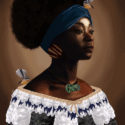Passion, intelligence, energy and a fierce desire to shape the Aotearoa rangatahi of today will live in, were hallmarks of a remarkable hui held in Rotorua in June (6-9, 2019).
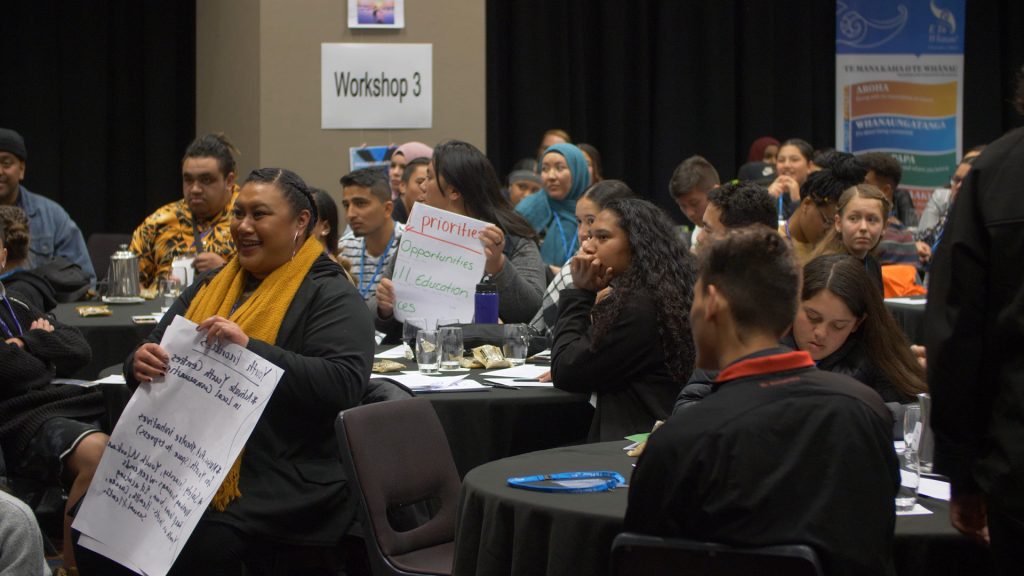 More than 100 young tangata whenua and tauiwi from almost as many different ethnic and social backgrounds, and their chaperones and supporters, came together for the second PALMS (Peaceful Action Leadership Movements), hui to consolidate a movement for positive change that started two years ago.
More than 100 young tangata whenua and tauiwi from almost as many different ethnic and social backgrounds, and their chaperones and supporters, came together for the second PALMS (Peaceful Action Leadership Movements), hui to consolidate a movement for positive change that started two years ago.
The movement emerged organically as young kahukura from different ethnic and socially diverse communities supported by E Tū Whānau, sought to connect with other young people from outside their own worlds.
Rich diversity
The young people who came to PALMS 2019 listened, observed and assimilated the views and experiences of people that they wouldn’t normally meet in their daily lives.
They ranged in age from teenagers to pakeke in their late 20’s.
They came from small towns and cities, from Māori, Pākehā, African, South American, Asian and Pasefika communities. There were forestry workers, high school and tertiary students, graphic artists, community kaimahi, aspiring social workers, teachers, film makers and politicians.
Their family backgrounds were just as varied. Some came from loving and culturally confident whānau, others lacked parental support, or faced potentially restrictive traditions. Some were healthily ambitious for their communities, whānau and themselves. For others, the sense of possibilities emerging from the hui was a revelation.
Messages from rangatahi
Shaneece Brunning, an 18-year-old kahukura from Taupo, reminded her fellow rangatahi that “everything is connected through mauri.”
“We are seeing beyond the horizon of the normal,” she said. ‘’We have a dream but, in the dream, we are all awake. This is our vision.”
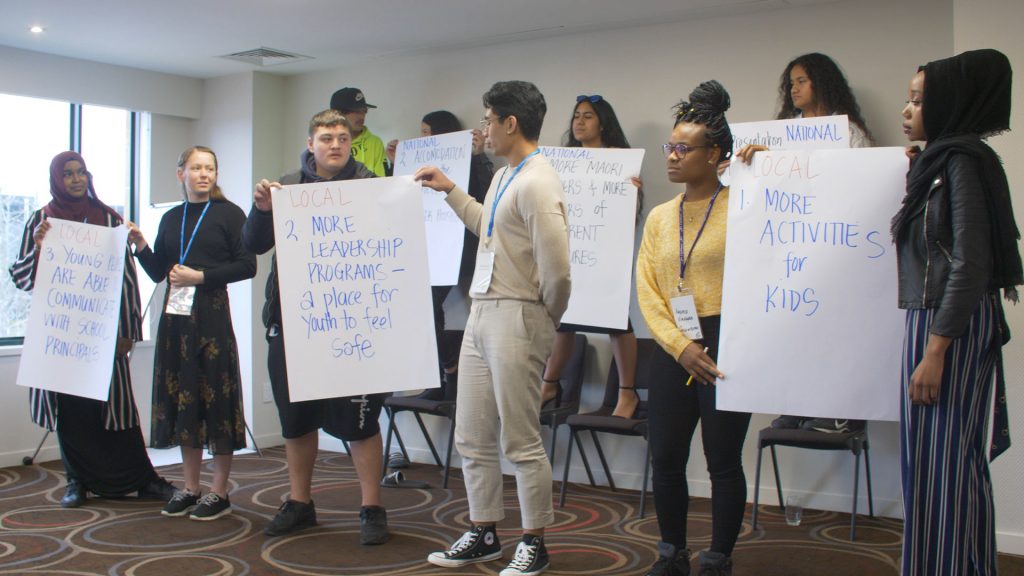 Lora Waqabitu, a young Fijian New Zealander, spoke about her personal struggles to fit into Pākehā dominated society with its narrow sense of what looked normal and acceptable.
Lora Waqabitu, a young Fijian New Zealander, spoke about her personal struggles to fit into Pākehā dominated society with its narrow sense of what looked normal and acceptable.
“But that’s all changing and PALMS 2019 is a great example of this. It’s an inclusive place with an amazing variety of people – tangata whenua, migrants, some who have been here for generations, some who have just arrived.
“We are all here under one roof, starting to use our voices to create change.”
Over the three days of the hui, rangatahi broke out of their comfort zones and into groups with people they didn’t know to tease out the issues they want New Zealanders to take on board.
Climate, racism and much more
Climate change, racism, homelessness, social justice, mental health, embracing Te Reo, justice for Māori and all disenfranchised people were issues raised and canvassed in different ways by everyone.
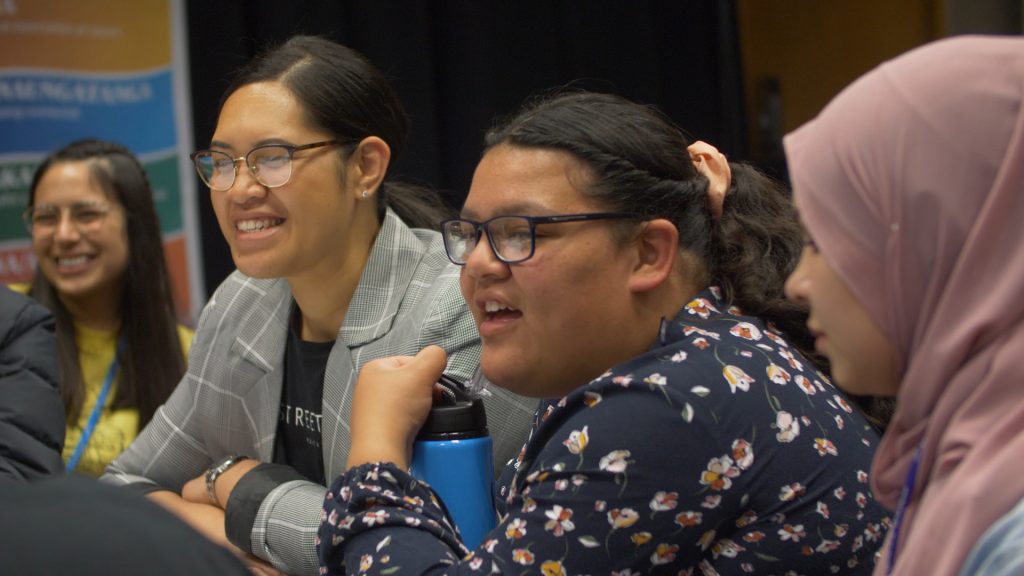 Others spoke from their own, faith-based perspectives. They wanted to be allowed to be who there were and they wanted others to understand and respect their choices.
Others spoke from their own, faith-based perspectives. They wanted to be allowed to be who there were and they wanted others to understand and respect their choices.
But, as Lora pointed out, they wanted to do more than just talk. They wanted change and they wanted to be listened to.
“I’m hopeful that our voices will lead to change if the right people are in the room are listening.”
She said that having a few influential people like Human Rights Commissioner Paul Hunt, and others who came along to listen, was important.
“I think they got the key issues. I just hope they turn those insights into positive action,” she said.
Not just the future
There was an element of frustration among some of the rangtahi, who said they were sick of being told that they’re the future.
“Actually,” said one rangatahi, “we’re here now. You can listen to us now.”
Fatana Abdiem Sunussi, a young Sudanese woman from Auckland told the whole group what she witnessed during a recent visit to whānau in Sudan.
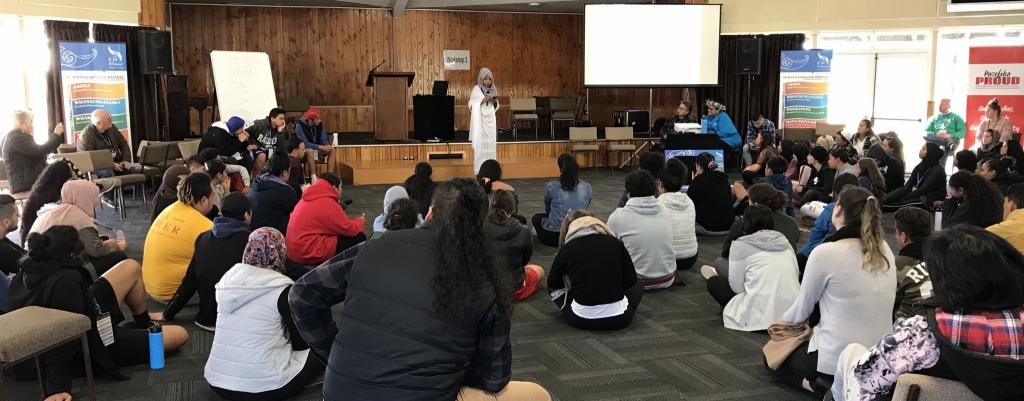 Dressed in flowing white robes traditional to the woman of her community, she told rangatahi about the brutality faced by people involved in current, widespread protests against the Sudanese government. She challenged rangatahi to learn more about the battle her people faced and find ways to make their voices heard by other New Zealanders. The audience was spellbound by her honest and passionate kōrero and for many, it was a lightbulb moment.
Dressed in flowing white robes traditional to the woman of her community, she told rangatahi about the brutality faced by people involved in current, widespread protests against the Sudanese government. She challenged rangatahi to learn more about the battle her people faced and find ways to make their voices heard by other New Zealanders. The audience was spellbound by her honest and passionate kōrero and for many, it was a lightbulb moment.
Tangiwai Raroa was part of a Māori whānau from Ruatoria who talked to Fantana afterwards.
“We were blown away because she was just as fascinated by our day to day life, our issues and culture as we were of hers.”
“We just thought our world, was ordinary and kinda boring but she was genuinely interested and wanted to know heaps.”
This was a sentiment echoed time and again throughout the hui.
A young Somali woman from Christchurch says the glimpse she now has of the different peoples living in Aotearoa makes her want to travel all over the country and find out more about the different Māori and Pasefika communities.
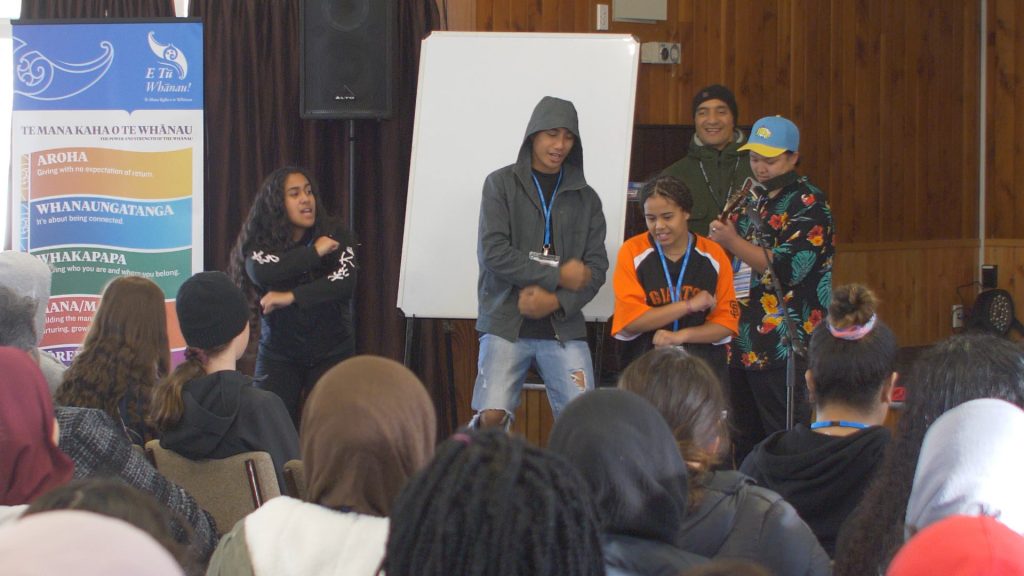 The hui was as inspiring, joyful and fun filled as it was thought provoking. Haka, presentations traditional dances, and planned and impromptu performances of all kinds got everyone up from their seats each evening, dancing, clapping and cheering on their friends, both new and old.
The hui was as inspiring, joyful and fun filled as it was thought provoking. Haka, presentations traditional dances, and planned and impromptu performances of all kinds got everyone up from their seats each evening, dancing, clapping and cheering on their friends, both new and old.
Step forward and realise vision
At the beginning of the hui, E Tū Whānau Kaiwhakahaere, Ann Dysart said that after the first PALMS Hui in 2017, when youth from diverse communities came together for the first time, rangatahi told her team what they wanted to make the movement go forward.
“You told us that you wanted to use your energy, ideas and talents to transform your communities, your families and society. We’re here to capture that talent and build on it.
“All of you have important roles in your communities, your faith groups and your whānau. It’s time for you to step forward and make your vision real.”
 Treaty-based culture
Treaty-based culture
Renowned kaumātua and constitutional lawyer, Moana Jackson was one of the few older people who spoke at the hui.
He told his youthful audience that the Treaty of Waitangi is the blueprint for the diverse Aotearoa of the future.
“Māori saw the Treaty as setting out a relationship so that anyone who settles here would have a place, while Māori would keep their own place.”
He said that the Māori world view towards tauiwi remains the same as it was when his tipuna signed the Treaty of Waitangi.
“If we welcome someone on our marae, we don’t say you have to be like us.
“You can come to live in this land, and we will respect you for the history, the culture and the language that you bring. Māori understand that we are all different and respect our differences.”
This, he said, is fundamental to the Māori way of seeing things. It’s the essence of kotahitangi and the future of Aotearoa.
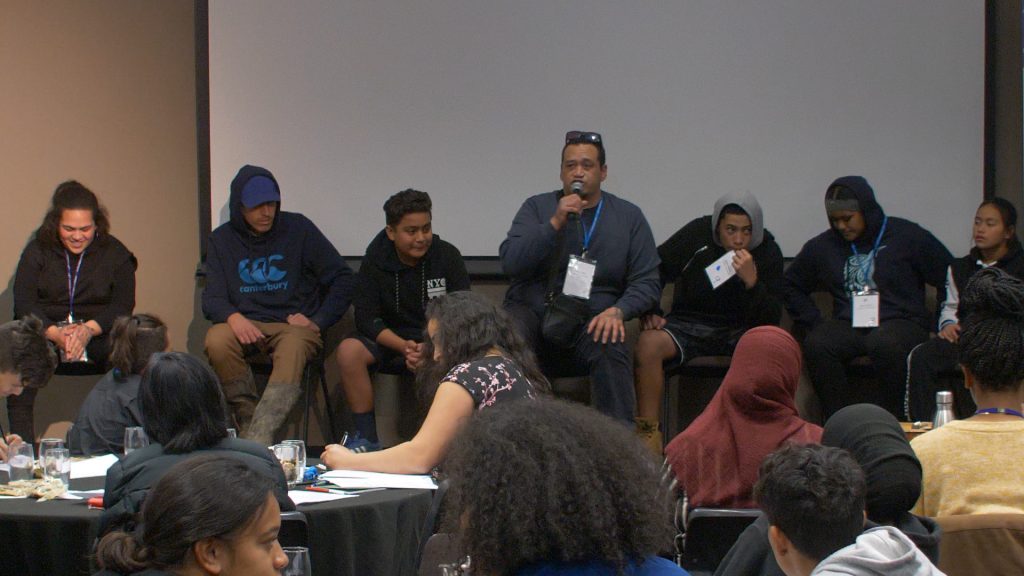 The final words go to one of the chaperones, Fallon Hauraki, who posted this on Facebook.
The final words go to one of the chaperones, Fallon Hauraki, who posted this on Facebook.
“We gathered in Rotorua to be a part of this amazing kaupapa and I have to say whānau, the vision is real. Change is gonna happen and I can’t wait to see what the future holds for all of us.
“I wish everyone the best in their journey and keep growing and keep the movement within your youth groups flowing. The world is your oyster. Seek beyond the horizon and take leaps of faith.”



